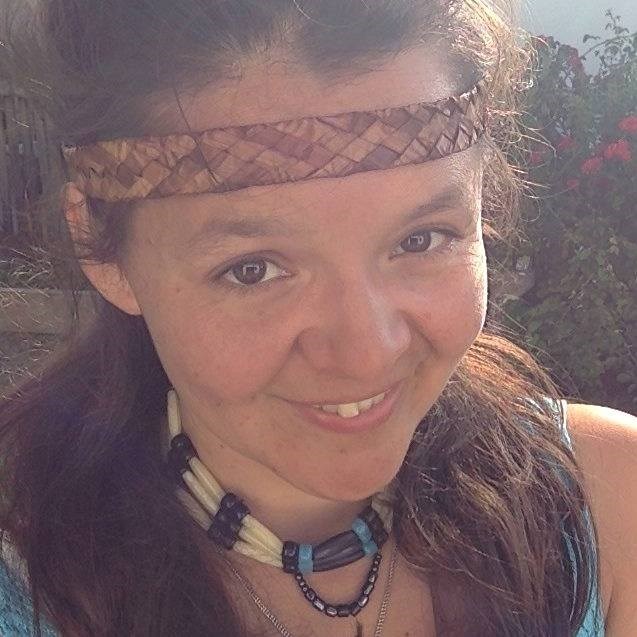Her name is Pulxaneeks (pronounced Pull-HA-neeks). An ancestral name, it means “Essence of Flower.”
As we chat over a cup of tea about her “Where I Stand” workshop at the library on May 14 at 7 p.m., Pulxnaeeks tells me she likes to get to the heart of things, the essence of things. And that’s what she does in her workshops, she gets to the heart of colonization.
Pulxaneeks, a member of the Eagle Clan of the Haisla First Nation, was born in a coastal village in northern B.C., a handful of generations after first contact with Europeans. She was raised by her village.
“It is a post-genocidal village,” she says. “We were only recently domesticated as a people. The English language was only recently violently enforced upon us. I’m here because my Elders were fortunate enough to have survived that.”
When she was eleven, she attended a youth culture camp “in the untouched depths of my ancestral land.”
“I lived like my ancestors had lived. These camps led the way for the rest of my life,” she says.
She remembers there was always “a nice white person at those camps who had a drum and was usually vegetarian. My first allies. I always thought there’s got to be more of you out there.”
At age 14, “an incredibly shy Native girl,” she became a volunteer guide, a helping role at the camps.
“With the support of my community, it was there I found where my gifts wanted to shine,” she says.
Pulxaneeks found a sense of empowerment through the traditional west coast singing, dancing and drumming.
She also lived in the colonial town of Kitimat. When I ask about her life there, she tells me she “often felt invisible or ashamed about not being accomplished by colonial standards.”
When she moved away at age 19, Pulxaneeks did youth outreach with First Nations youth at risk, wanting to contribute to the future of Indigenous people through the youth.
Pulxaneeks moved to Bowen last fall. She smiled and told me she knew this was a good place to live when she saw there was a book club to read Indigenous authors (that would be the Knowing Our Place Book Club).
Since 2003, she has been facilitating workshops. She calls her work Heart to Heart: Indigenous Relations Consultation.
“Regardless of your lineage origins,” she says, “we have all been colonized.”
I ask her about the transformations that take place in her workshops.
“People gain a better understanding of these patterns of pain holding us back. Until we understand this, it’s still going to keep happening. They gain a better footing and know where they stand as Guest on Indigenous Land,” she says.
I’m honoured that Pulxaneeks has invited me to be a support person for other upcoming workshops: one on Bowen, June 1 from 10 a.m. to 8 p.m. at Elliot Hall, 1070 Miller Road. And July 5 to 7 in Vancouver. For more information please email [email protected]
“It’s not possible for there to be any significant change and not feel uncomfortable,” she says. “I draw to me people who are okay with this.”
I’m trying to massage an upbeat ending to this piece, give it a nice colonial ending, as she might say.
“So,” I venture, “they’ll feel uncomfortable but… they will …” She refuses to put a shiny spin on it.
“The greater powers have done a good job of keeping folks ignorant. We cannot make effective changes if we don’t first understand what’s at the roots,” she replies.
Pulxaneeks will present Where I Stand, May 14 at 7 p.m. at the library.
This interactive presentation is part of the Knowing Our Place Reconciliation Initiative presented by the library, the arts council and Pauline Le Bel.
It’s an opportunity to get a better sense of one’s identity as a guest on Indigenous land and to begin the lifelong practice of coming back to being in right relationship to the First Peoples. The workshop is free but registration is required as space is limited.
Pulxaneeks request before you register, is that you find out on whose land you were born.
Please register at: bit.ly/KOPWhereIStand.



